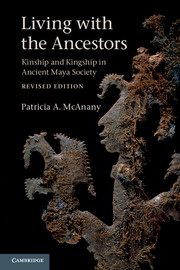Book contents
- Frontmatter
- Dedication
- Contents
- Figures and Table
- Preface
- Living with the Ancestors: Kinship and Kingship in Ancient Maya Society
- Introduction to the Revised Edition
- ONE A Point of Departure
- TWO Ancestor Veneration and Lineage Organization in the Maya Region
- THREE Creating a Genealogy of Place
- FOUR Lineage as a Crucible of Inequality
- FIVE Kin Groups and Divine Kingship in Lowland Maya Society
- SIX Ancestors and Archaeology of Place
- POSTSCRIPT The Future of the Ancestors and the Clash between Science and Human Rights
- Notes
- References Cited
- Index
Preface
Published online by Cambridge University Press: 05 July 2014
- Frontmatter
- Dedication
- Contents
- Figures and Table
- Preface
- Living with the Ancestors: Kinship and Kingship in Ancient Maya Society
- Introduction to the Revised Edition
- ONE A Point of Departure
- TWO Ancestor Veneration and Lineage Organization in the Maya Region
- THREE Creating a Genealogy of Place
- FOUR Lineage as a Crucible of Inequality
- FIVE Kin Groups and Divine Kingship in Lowland Maya Society
- SIX Ancestors and Archaeology of Place
- POSTSCRIPT The Future of the Ancestors and the Clash between Science and Human Rights
- Notes
- References Cited
- Index
Summary
This book is about the practice of ancestor veneration in ancient Maya society. Written while I was a visiting fellow at Dumbarton Oaks Research Library in Washington, D.C., this work metamorphosed from an earlier project on Maya economic organization. The more I researched economic aspects of Maya society—land tenure and agriculture in particular—the more I came to appreciate the strategic role played by ancestors in legitimizing claims to land and in the inheritance of everything from field plots to orchards and houses. From this, I reasoned that ancestral Maya burials and the ancient structures in which they were interred have the potential to tell us something about larger forces at work in society. They provide a strong link between the material basis of life and the ideological framework which both reflects and creates reality.
Ancestor veneration, as a creative social practice, is about naming and claiming—naming progenitors, naming descendants, and by virtue of these proper nouns establishing proprietary claims to resources. This point was brought home to me one day during the Fellows' luncheon at Dumbarton Oaks. John Yellen had joined us and I was describing this book project to him. Given the fact that John has spent his entire research career either following African hunters and gatherers or mapping and excavating what little they left behind, I was not sure that he would be particularly interested in my research on the link between ancestors and land. Quite to the contrary, he parlayed my rather stiff narrative with a story about fieldwork in the Kalahari Desert that so perfectly characterizes the counterpoint to my thesis of Maya perspectives on land and resource claims that I narrate it here.
- Type
- Chapter
- Information
- Living with the AncestorsKinship and Kingship in Ancient Maya Society, pp. xi - xivPublisher: Cambridge University PressPrint publication year: 2014

